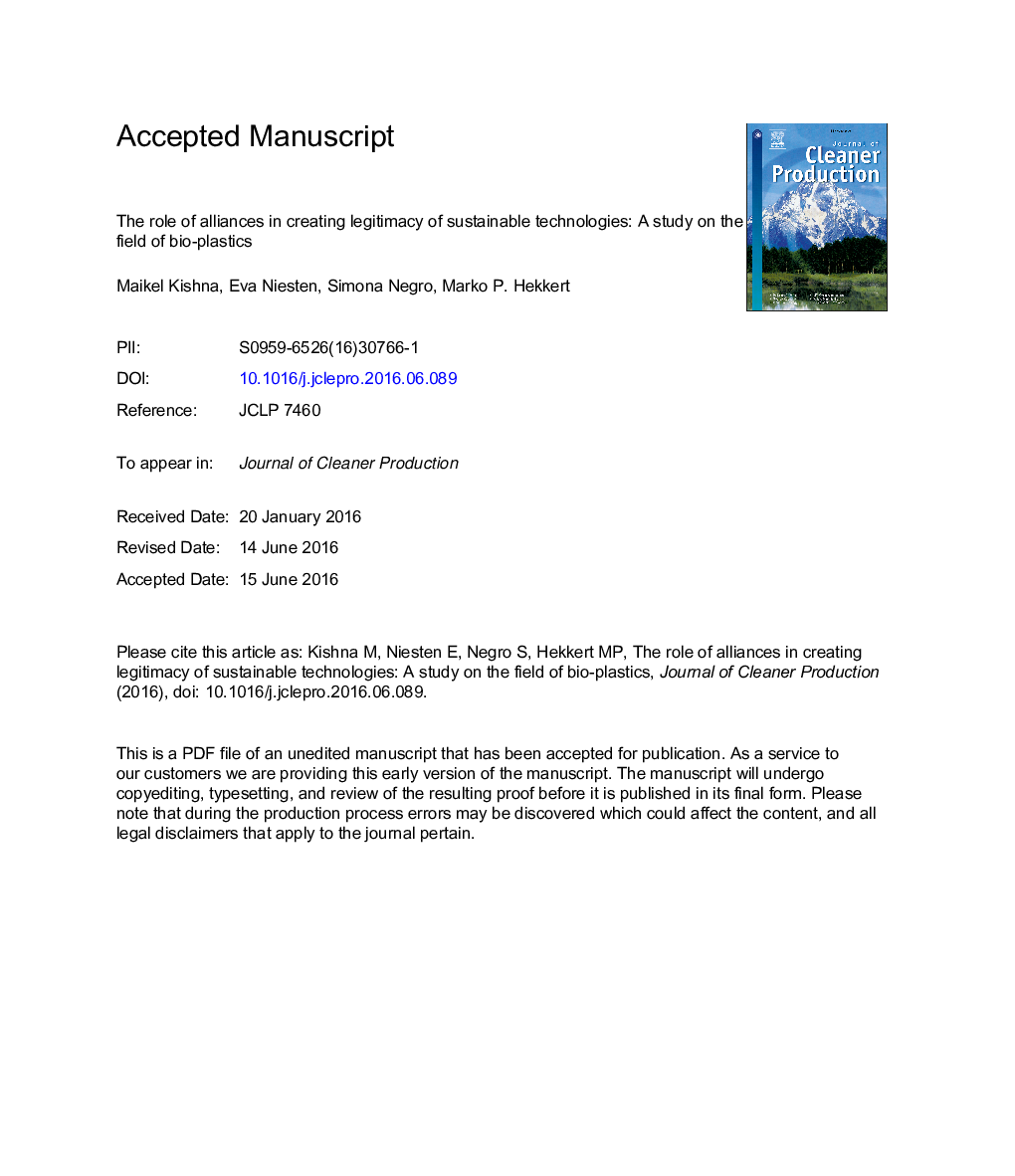| کد مقاله | کد نشریه | سال انتشار | مقاله انگلیسی | نسخه تمام متن |
|---|---|---|---|---|
| 5481196 | 1399329 | 2017 | 23 صفحه PDF | دانلود رایگان |
عنوان انگلیسی مقاله ISI
The role of alliances in creating legitimacy of sustainable technologies: A study on the field of bio-plastics
ترجمه فارسی عنوان
نقش اتحاد در ایجاد مشروعیت فن آوری های پایدار: مطالعه در زمینه پلاستیک های زیستی
دانلود مقاله + سفارش ترجمه
دانلود مقاله ISI انگلیسی
رایگان برای ایرانیان
کلمات کلیدی
اتحادها، مشروعیت تکنولوژی پایدار، بیو پلاستیک،
ترجمه چکیده
در انتقال به دنیای پایدارتر، توسعه فن آوری های پایدار باید با ترویج مشروعیت فن آوری ها همراه باشد. مصرف کنندگان که تکنولوژی را به عنوان مطلوب و مناسب درک می کنند، احتمال بیشتری دارند که آن را اتخاذ کنند. سازمانها می توانند برای مشروعیت فن آوری های جدید همکاری کنند. در حالی که تحقیقات قبلی بر اهمیت همکاری در زمینه پایداری تأکید کرده اند، آن ها تلاش های مشترک سازمان هایی را با هدف دستیابی به مشروعیت فن آوری های پایدار مورد بررسی قرار نداده است. بنابراین سهم این مقاله، تجزیه و تحلیل نقش اتحادیه های سازمانی در ایجاد مشروعیت برای یک تکنولوژی پایدار است. این مقاله به ادبیات کمک می کند با تحلیل اینکه چگونه اتحاد ها سه نوع مشروعیت ایجاد می کنند: مشروعیت بازار فناوری، مشروعیت اجتماعی مبتنی بر فن آوری و مشروعیت فناوری. این تمرکز بر مورد پلاستیک های زیستی است که به عنوان یک تکنولوژی پایدار در صنعت شیمیایی ظهور می کند. تجزیه و تحلیل بر اساس یک پایگاه داده حاوی اطلاعات در مورد 105 اتحاد در زمینه پلاستیک های زیستی در دوره 1990-2013 است. نتایج نشان می دهد که اتحادها با هدف ایجاد بازار تکنولوژی و مشروعیت اجتماعی از طریق ارائه دسترسی به فن آوری پایدار یک شریک، با همکاری توسعه یک تکنولوژی پایدار یا ارائه تکنولوژی یک شریک با دسترسی به مشتریان و ظرفیت تولید، هدف می گیرند. اتحادها مشروعیت فناوری را با تکیه بر عواقب جانبی مثبت، با استفاده از نقش سیگنالیشان خود و با عمل به عنوان کارآفرینان سازمانی، ترویج دهند. این مقاله نتیجه می گیرد که بین اتحاد هایی که از یک بازار تکنولوژیکی و مشروعیت اجتماعی از یک سو و از سوی دیگر مشروعیت فناوری ایجاد می کنند، اختلاف وجود دارد. نوع اول اتحاد ها اغلب دو جانبه بین شرکت های سودآور است که فن آوری های پایدار تولید و بازاریابی می کنند. در مقابل، اتحاد هایی که مشروعیت فناوری را تحریک می کنند، اتحاد های چندجانبه ای هستند که در مرحله قبل از رقابت زنجیره ارزش فعالیت می کنند و شامل سازمان های غیر انتفاعی می شوند.
موضوعات مرتبط
مهندسی و علوم پایه
مهندسی انرژی
انرژی های تجدید پذیر، توسعه پایدار و محیط زیست
چکیده انگلیسی
In the transition to a more sustainable world, the development of sustainable technologies needs to be accompanied by promoting the legitimacy of the technologies. Consumers that perceive a technology as desirable and appropriate are more likely to adopt it. Organizations can collaborate to enhance the legitimacy of new technologies. While previous research has emphasized the importance of collaboration in the field of sustainability, it has not studied collaborative efforts of organizations aimed at achieving legitimacy of sustainable technologies. The contribution of this paper is therefore to analyze the role of inter-organizational alliances in creating legitimacy for a sustainable technology. The paper contributes to the literature by analyzing how alliances create three types of legitimacy: technology-sourced market legitimacy, technology-sourced social legitimacy and technology legitimacy. It focuses on the case of bio-plastics, which is emerging as a sustainable technology in the chemical industry. The analysis is based on a database containing information on 105 alliances in the field of bio-plastics over the period 1990-2013. The results show that alliances aim to promote technology-sourced market and social legitimacy by providing access to the sustainable technology of a partner, by collaboratively developing a sustainable technology, or by providing the technology of a partner with access to customers and production capacity. Alliances promote technology legitimacy by relying on positive externalities, by exercising their signaling role, and by acting as institutional entrepreneurs. The paper concludes that there are differences between alliances that create technology-sourced market and social legitimacy on the one hand, and technology legitimacy on the other hand. The first type of alliances are often bilateral alliances between for-profit companies that produce and market sustainable technologies. In contrast, alliances that stimulate technology legitimacy are multilateral alliances that operate in the pre-competitive stage of the value chain and involve not-for-profit organizations.
ناشر
Database: Elsevier - ScienceDirect (ساینس دایرکت)
Journal: Journal of Cleaner Production - Volume 155, Part 2, 1 July 2017, Pages 7-16
Journal: Journal of Cleaner Production - Volume 155, Part 2, 1 July 2017, Pages 7-16
نویسندگان
Maikel Kishna, Eva Niesten, Simona Negro, Marko P. Hekkert,
